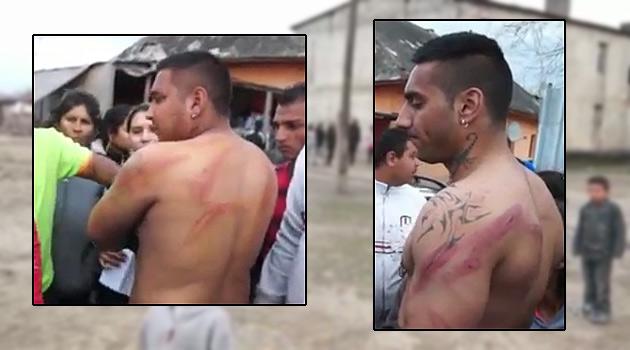Slovak ombud says police raid on Roma settlement was unnecessary

The SITA agency reports that the Slovak Public Defender of Rights (the ombud), Jana Dubovcová, says the police raid on the village of Vrbnica in Slovakia this past April was not necessary and should never have happened. She has completed her investigation of the intervention.
The ombud says police violated the fundamental rights and freedoms of 15 people during the raid. She has contacted police head Tibor Gašpar and asked him to correct the situation as soon as possible.
She is also asking the Police President to investigate whether such raids are racially motivated, targeting Roma in Slovakia because of their ethnicity. She believes that is the case.
According to police statistics, the so-called "search action 100" that police performed in Vrbnica is customary police practice in the region. Since 2013 there have been no such interventions in the Bratislava Region, but there have been 259 in the Prešov Region.
"This is a disproportion that prompts serious doubts as to why such interventions are undertaken," the ombud said at a press conference. Police are only permitted to carry out such interventions in certain situations, but the ombud said that the Vrbnica case did not rise to that level.
"This was not a case of protecting the national interest or the public interest, nor of preventing crime or unrest," she explained. Police were looking for wanted persons in the Romani settlement, but they are only permitted to invade someone’s home when they know for certain that a specific person is there.
"The police did not know where the wanted persons were staying, and because they did not know, they did not have the option of breaking into people’s homes on the basis of that consideration," she said, adding that the legal requirements for such an intervention were not met. Police claimed after the intervention that they used no force against inhabitants of the settlement, but medical records and photographs from the scene of the raid show the opposite.
Dubovcová is reproaching police for not having produced a video recording of the intervention even though the Slovak Interior Minister instructed police to acquire such footage during such raids as long ago as 2007. A detective with the Slovak Interior Ministry’s Inspectorate initiated a general criminal investigation on 9 April with respect to the Vrbnica raid on suspicion of abuse of the powers of a public official but has not yet charged anyone specifically.
SITA reports that the Slovak Interior Ministry’s press department says that investigation is still ongoing. Mayor of Vrbnica Jaroslav Tokar says many Romani people were injured during the raid.
Inhabitants of the village claim police officers used disproportionate force during their house searches. They also complained that the raid swept up people who live respectably and have never broken the law.
VIDEO
SELECTED PROBLEMATIC POLICE INTERVENTIONS AGAINST ROMANI PEOPLE IN SLOVAKIA
August 1999 – A 21-year-old Romani man dies after a police interrogation as a result of a gunshot wound to the abdomen. According to the official version of events, the man grabbed a detective’s pistol and shot himself during interrogation at a police station in Poprad. The case made it to the European Court of Human Rights 11 years later thanks to the efforts of the young man’s widow.
6 July 2001 – At a police station in the Central Slovakian town of Revúca, several police officers beat a 51-year-old Romani man, Karol Sendrei, so brutally that he died as a result of his injuries. Seven police officers were charged in the case and released six months later. Four of them were then convicted and given sentences ranging from four to eight and a half years in prison.
21 March 2009 – Police officers in Košice detained six Romani boys aged 10 -15 after they allegedly injured and robbed an older woman. At the police station, under the threat of corporal punishment and a constant torrent of verbal abuse, the police forced the boys to kiss each other, slap each other, and strip naked. The scenes of humiliation were recorded using a mobile telephone. Nine police officers were fired in connection with the crime. On 27 February 2015 all 10 of the current or former police officers prosecuted in connection with the crime were acquitted.
9 May 2010 – After a riot unit intervention in Tornal’a during the annual celebrations there to honor the victims of the Second World War, a 46-year-old Romani man died of suffocation after police officers allegedly used a disproportionate amount of teargas against him. According to witnesses, officers beat and kicked the man.
16 June 2012 – A former municipal police officer in Hurbanovo, southern Slovakia, shot a 44-year-old man, the man’s son and the man’s father-in-law with a weapon he was not licensed to use. Another son of the main victim survived a gunshot through the lung and his wife suffered a leg injury during the incident. The ex-officer said he wanted to "solve the problem of inadaptable inhabitants" by shooting them.
19 June 2013 – Ten police officers and riot police occupied the Romani settlement in Moldava nad Bodvouduring the evening. Officers were allegedly looking for wanted persons there. Shortly after the police raid, however, occupants of the settlement claimed the officers broke into their homes for no reason, attacking children and women and reportedly using stun guns and tear gas.
2 April 2015 – Police officers allegedly beat up approximately 19 Romani people in the municipality of Vrbnica, Michalovce District, during a house-to-house search code-named "100". Medical attention was sought by 10 residents.